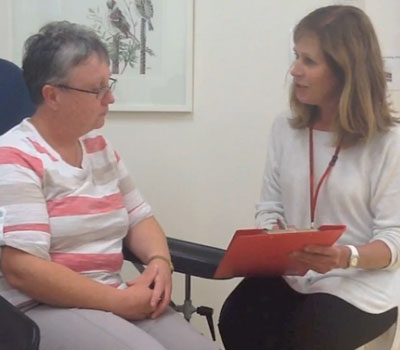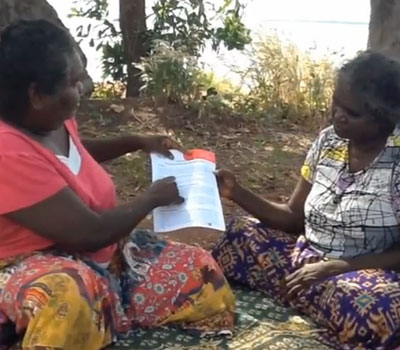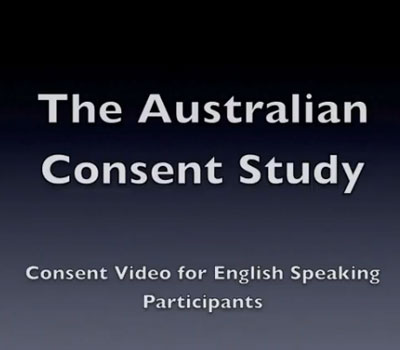Centre for Law and Genetics
Australian Consent Study
Improving Informed Consent in Research to Protect Participants (Australian Consent Study)
Funding Source: University of Tasmania Grant
Project Duration: 2014-2015
Project Status: Completed
Researchers
- Dr Rebekah McWhirter (CI)
- Dr Lisa Eckstein (CI)
Project Summary
 Informed consent is fundamental to research involving human participants. Although ethical guidelines recommend presenting study information in ways that are appropriate for individual participants, most studies use a one-size-fits-all standard written information sheet and consent form.
Informed consent is fundamental to research involving human participants. Although ethical guidelines recommend presenting study information in ways that are appropriate for individual participants, most studies use a one-size-fits-all standard written information sheet and consent form.
The Adult Literacy and Life Skills Survey found that 46% of Australians aged 15 and over were not sufficiently prose literate to confidently read a newspaper or understand instructions on a medicine package. This means that for almost half the Australian population, standard consent materials are a poor means of communicating information. Further, there are a number of groups of participants whose needs might not be met by standard consent materials, including people with a cognitive impairment, intellectual disability or mental illness, children, Aboriginal and Torres Strait Islanders, and people whose primary language is other than English.
This suggests that multimedia approaches to informed consent might be beneficial in some circumstances, although the evidence to date is inconclusive and of variable quality. Ultimately we would like to provide a set of evidence-based tools for researchers to adapt to provide appropriate consent processes that support understanding and a better quality of consent in research.
About
 This study grew out of discussions with participants in a cancer study being conducted in a remote Aboriginal community in the NT, Galiwin'ku on Elcho Island, where a great deal of research is undertaken. These participants noted that different studies varied considerably in the effort they put in to explaining their research, and that some methods were not really appropriate in that setting. They stressed that it was important that researchers understood the 'right way' to explain information, so that participants could make good decisions about whether they wanted to be involved in the study or not.
This study grew out of discussions with participants in a cancer study being conducted in a remote Aboriginal community in the NT, Galiwin'ku on Elcho Island, where a great deal of research is undertaken. These participants noted that different studies varied considerably in the effort they put in to explaining their research, and that some methods were not really appropriate in that setting. They stressed that it was important that researchers understood the 'right way' to explain information, so that participants could make good decisions about whether they wanted to be involved in the study or not.
To follow up on this idea, this study pursued two primary aims:
- Undertake an audit of the Tasmanian Human Research Ethics Committee records, to determine how research projects obtain informed consent from participants, and how the needs of special groups (as defined in the National Statement on Ethical Conduct in Human Research) are addressed.
- Identify the requirements of different stakeholders in consent processes and how these needs could be most effectively addressed.
Data collection for these two aims has been completed. Findings will be used to develop multimedia tools to help researchers construct better consent processes for their studies, and to inform further development of guidelines for HRECs and researchers.
Participants
Interviews have been conducted with participants from a broad range of backgrounds, including:
- Researchers across a range of disciplines (clinical trials, genetics, Indigenous health, health promotion, psychology, education etc.)
- HREC members from Tasmania (Health and Medical, and Social Sciences) and the Northern Territory (main committee and Aboriginal sub-committee)
- Participant groups (Aboriginal participants from Elcho Island, members of the refugee community, older Australians)
Participants consented to the study using a specially developed iPad app for informed consent, that explained the study using video and audio (translated where appropriate) to complement the text. People who agreed to participate were given the option of either signing their name or recording (audio or video) their consent. All data was then archived, encrypted, allocated a randomly generated ID and transferred to the secure university server. A secondary aim of this project was therefore to evaluate the experience of using a multimedia approach for undertaking informed consent with a range of participant groups with widely varying needs.

